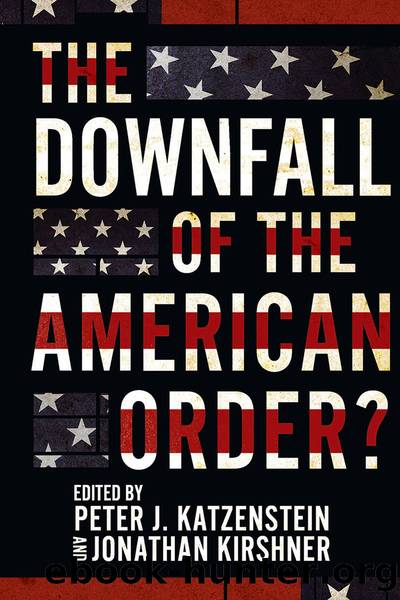The Downfall of the American Order? by Peter J. Katzenstein

Author:Peter J. Katzenstein
Language: eng
Format: epub
Publisher: Cornell University Press
Published: 2022-02-20T00:00:00+00:00
7
POST-AMERICAN MOMENTS IN CONTEMPORARY GLOBAL FINANCIAL GOVERNANCE
Ilene Grabel
The American-led international economic order that emerged from World War II featured the dominance of embedded liberal ideas and practices.1 This first American-led order involved, inter alia, a unipolar global financial governance architecture organized around the dollar and the Bretton Woods institutions (BWIs) and wide consensus around Keynesian principles of economic management. The order featured domestic and international economic arrangements designed to promote growth, along with mechanisms to protect domestic policy objectives (and the domestic economy itself) from external pressures and volatilityâespecially those emanating from the financial sector.2 The ambitions and compromises at the heart of this order reflected the widely held view, cemented during World War II, that economic nationalism was untenable and dangerous. The way forward required cooperation and multilateralism as cornerstones of economic restoration and international peace.3 The multilateralism was permissive, providing space for cross-national domestic policy heterogeneity. Indeed, the agreement to disagree on matters of domestic policy was hardwired into the system through Article IV of the newly created International Monetary Fund (IMF).
The second American-led international order was characterized by the displacement of Keynesian sensibilities by the neoliberal doctrine of Milton Friedman and Friedrich Hayek. The order reified markets and diminished the role of the state as an economic actor and protector while installing a restrictive multilateralism that promoted convergence to US policy and institutional norms. The neoliberal order placed a straightjacket on national policy autonomy. The emergent neoliberalism reinforced existing US-led financial unipolarity in ways that amplified the role and power of the BWIs and US-based financial actors and interests. With notable exceptions, this order promoted the primacy of the hyper-liberalized American financial model as the global ideal. It dismantled embedded liberalism where its foundations were weakest and put it on the defensive elsewhere.
A series of financial crises exposed internal contradictions in the neoliberal order. Unlike the demise of the first order, the crises of the 1990s and the global crisis of 2008 (hereafter âglobal crisisâ) threatened not just the predominant economic model but also the centripetal force of the global financial governance architecture. The global crisis generated contradictory effects on the global financial governance architecture and on neoliberalism, deepening fissures in the US-led regime while also reinforcing the central role of the United States.
But where does this leave us? The best that can be said is that we are in an interregnum in which there is no consensus among economists and policymakers, no coherent, singular âismâ to guide policy formation, nor even a set of contending coherent systems of economic arrangements. Instead, we confront the simultaneous proliferation of a range of regimes that include kleptocratic capitalism, state capitalism, social democratic multilateralism, neoliberal nationalism, neonationalism, and what I call below âembedded populism.â4 An expanded set of diverse actors and institutions has joined the conversation in global economic governance, pushing forward with ambitious new institutions and initiatives. Many are encouraging; others certainly are not. Some of the initiatives threaten existing arrangements, while others mimic practices pioneered by established actors and institutions.
Download
This site does not store any files on its server. We only index and link to content provided by other sites. Please contact the content providers to delete copyright contents if any and email us, we'll remove relevant links or contents immediately.
International Integration of the Brazilian Economy by Elias C. Grivoyannis(109650)
The Radium Girls by Kate Moore(12016)
Turbulence by E. J. Noyes(8040)
Nudge - Improving Decisions about Health, Wealth, and Happiness by Thaler Sunstein(7690)
The Black Swan by Nassim Nicholas Taleb(7106)
Rich Dad Poor Dad by Robert T. Kiyosaki(6605)
Pioneering Portfolio Management by David F. Swensen(6288)
Man-made Catastrophes and Risk Information Concealment by Dmitry Chernov & Didier Sornette(6003)
Zero to One by Peter Thiel(5786)
Secrecy World by Jake Bernstein(4740)
Millionaire: The Philanderer, Gambler, and Duelist Who Invented Modern Finance by Janet Gleeson(4464)
The Age of Surveillance Capitalism by Shoshana Zuboff(4274)
Skin in the Game by Nassim Nicholas Taleb(4235)
The Money Culture by Michael Lewis(4196)
Bullshit Jobs by David Graeber(4179)
Skin in the Game: Hidden Asymmetries in Daily Life by Nassim Nicholas Taleb(3987)
The Dhandho Investor by Mohnish Pabrai(3758)
The Wisdom of Finance by Mihir Desai(3728)
Blockchain Basics by Daniel Drescher(3574)
